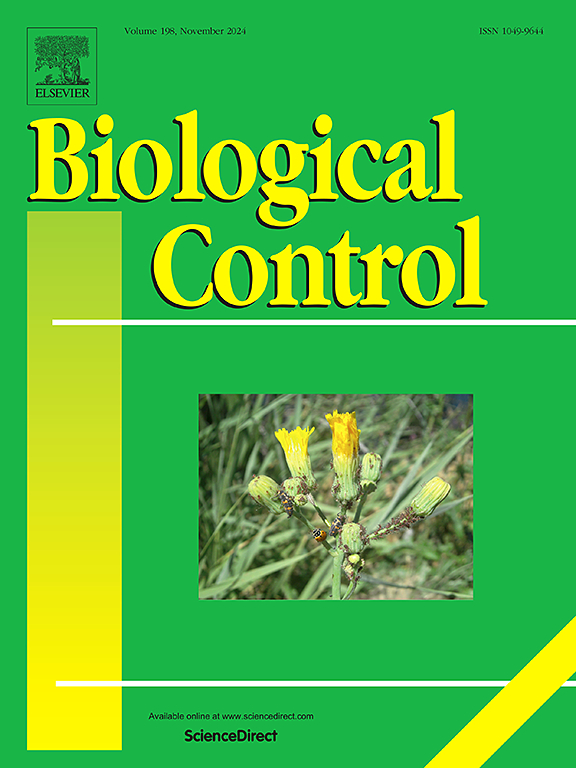基于不同原则的土壤管理策略对土壤微生物群落的影响及其对植物健康的影响
IF 3.7
2区 农林科学
Q2 BIOTECHNOLOGY & APPLIED MICROBIOLOGY
引用次数: 0
摘要
基于化学、物理和生物原理的各种土壤管理策略被用来操纵土壤微生物群落以改善植物健康。然而,这些策略如何改变微生物群落对病原体入侵的反应并促进植物健康仍然知之甚少。在这里,我们研究了化学、物理和生物策略,即化学熏蒸(CF)、热消毒(HE)和还原性土壤消毒(RSD)对土壤微生物群落、病原体入侵和植物性能的影响。结果表明,在不同策略下,土壤微生物群落的变化与其对病原菌抑制和植物健康的影响之间存在密切的关系。物化处理有效地降低了尖孢镰刀菌的密度,从而抑制了枯萎病的发生。然而,这些策略也降低了真菌密度、细菌多样性、网络复杂性和核心微生物组稳定性,导致病原体抗性降低和病原体再接种后植物疾病的复发。相比之下,生物管理是抑制病原菌入侵和改善植物健康的最有效策略。生物管理优化了细菌和核心微生物群,增加了细菌多样性,刺激了潜在疾病抑制剂的生长,从而有助于抵抗尖孢镰刀菌的入侵,并持续促进植物健康。综上所述,我们的研究结果表明,物理化学(CF和HE)和生物策略(RSD)通过不同的机制促进植物健康。此外,本研究还为生物管理对核心微生物群的操纵及其在植物健康中的关键作用的重大影响提供了经验证据。本文章由计算机程序翻译,如有差异,请以英文原文为准。
Effects of soil management strategies based on different principles on soil microbial communities and the outcomes for plant health
Various soil management strategies based on chemical, physical, and biological principles are used to manipulate soil microbial communities to improve plant health. However, how the microbial communities that are altered by these strategies respond to pathogen invasion and contribute to plant health remains poorly understood. Here, we investigated the effects of representative chemical, physical, and biological strategies, namely, chemical fumigation (CF), heat disinfestation (HE), and reductive soil disinfestation (RSD), on soil microbial communities, pathogen invasion, and plant performance. Our results revealed a strong relationship between variations in soil microbial communities and their impact on pathogen inhibition and plant health under the different strategies. Physicochemical management effectively decreased the density of Fusarium oxysporum, thereby suppressing the outbreak of Fusarium wilt. However, these strategies also decreased fungal density, bacterial diversity, network complexity, and core microbiome stability, resulting in diminished pathogen resistance and the recurrence of plant disease upon pathogen reinoculation. In contrast, biological management was the most effective strategy for the suppression of pathogen invasion and the improvement of plant health. Biological management optimized the bacterial and core microbiomes, leading to increased bacterial diversity and stimulated the growth of potential disease-suppressive agents, which contributed to resistance to F. oxysporum invasion and consistently prompted plant health. Taken together, our results reveal that physicochemical (CF and HE) and biological strategies (RSD) contribute to plant health via different mechanisms. In addition, this study provides empirical evidence for the significant impact of biological management on the manipulation of the core microbiome and its critical role in plant health.
求助全文
通过发布文献求助,成功后即可免费获取论文全文。
去求助
来源期刊

Biological Control
生物-昆虫学
CiteScore
7.40
自引率
7.10%
发文量
220
审稿时长
63 days
期刊介绍:
Biological control is an environmentally sound and effective means of reducing or mitigating pests and pest effects through the use of natural enemies. The aim of Biological Control is to promote this science and technology through publication of original research articles and reviews of research and theory. The journal devotes a section to reports on biotechnologies dealing with the elucidation and use of genes or gene products for the enhancement of biological control agents.
The journal encompasses biological control of viral, microbial, nematode, insect, mite, weed, and vertebrate pests in agriculture, aquatic, forest, natural resource, stored product, and urban environments. Biological control of arthropod pests of human and domestic animals is also included. Ecological, molecular, and biotechnological approaches to the understanding of biological control are welcome.
 求助内容:
求助内容: 应助结果提醒方式:
应助结果提醒方式:


